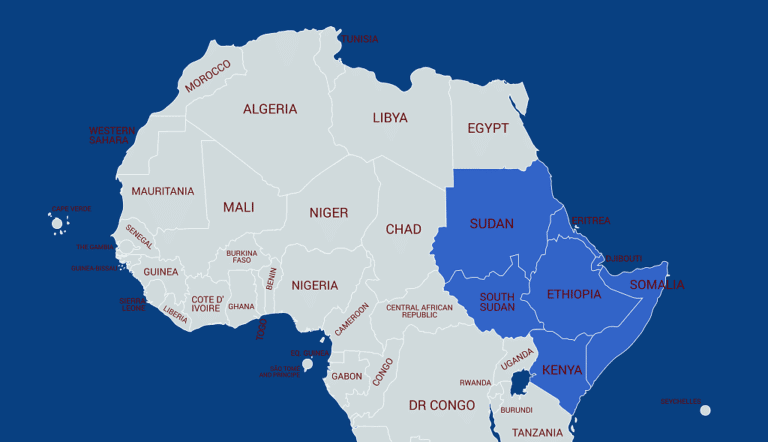By Dr. Suleiman Walhad
November 19th, 2022

John F. Kennedy once said that “Change is the law of life. And those who look only on to the past or present are certain to miss the future,” for certainly the future will come, but can be shaped. Certain facts are, however, unchangeable in the Horn of Africa States and would always shape the future of the Horn of Africa States, home of the SEED countries – Somalia, Ethiopia, Eritrea and Djibouti. At one time they were together the Habesha and other times the lands of the Berber, and still, at other times the land of the Kushites. The region, despite its various names remained important, not only economically, but also strategically. It was always a center of old-world rivalries and competitions. It was also always the entry point into the continent of Africa from the east and so it remains today.
Not only is the region relevant for major powers of the world today, but it is also important for regional powers and those with newly found wealth that need to project some kind of power beyond their desert enclaves. The old powers like the UK, France and their replacements, the United States and Russia, and China seem to be playing their traditional roles of hegemony over the region, but smaller countries like the UAE, Qatar, Egypt, and Saudi Arabia are also involved in the region, in the main, to serve the interests of the more powerful countries in the region, and hence indirectly themselves.
The security aspect of the Horn of Africa as a strategic location followed by commerce seems to be the main attraction of the powers that be in the region. This was always the case in the past as it will be in the future. But the region is endowed with another treasure, a large youthful population (nearly, if not above, 70% of the total population), which can be a source of labor should the right approach of developmental investments be adopted.
The Horn of Africa was fragmented by the European colonialism towards the end of the nineteenth century, and this gave rise to fake nationalisms based on ethnicity and/or false belief in birth right to rule. That past is over, and the way forward remains equitable development and regional unity at least in the socio-economic and political configuration vis a vis dealing with non-regional forces.
The global order is currently on the cusp of changing, hopefully for the better but over concentration of world power in the hands of one group is on the way out in general. The Ukraine war, the birth and growth of what is generally terms as the “BRICS” and the fact that the world is very much aware of the dangers of disharmony, all indicate that the Horn of Africa States will remain ever an important region for the world. It is up to the leaders of the region, how they would approach and address the interest of the world powers in the region.
Certainly, the Horn of Africa States owns a long coastal belt of some 4,700 km, a land surface of 1.8 million sq. km and a maritime EEZ of nearly also a million sq. km. It is the source of the Blue Nile, which provides fresh water not only to the region but also to Northeast Africa and ships transiting through the Suez Canal either way between Asia and Europe and even North America have to use the sea lanes of the Horn of Africa States. It is also home to the Grand Ethiopian Renaissance Dam or “GERD” which would provide energy not only to the region but beyond, and reports indicate a large hydrocarbon presence and other minerals of high value in the region.
The regional leaders are waking to the growing importance of the region and realize that dealing with it on a nation-state format is no longer workable. Working together and facing the music together is the better strategy and this is where the region should be going despite the attempts of some otherwise. Despite attempts to paint the region otherwise, its political leaders have to date displayed political maturity and do not attempt to use the strategic importance of the region to disrupt world interests. The violence, in the region, stays within, as if it was so designed. Keep them busy!
Many still read the region in the eyes of the past – a violent, immature, politically disparate region. This is far from the truth. The region is growing, attending to the violence imported from outside the region, realizing the benefits of working together, not only for each of the SEED countries, but also for the rest of the world. The Horn of Africa States generally assures the smooth flow of shipping in its waters, uninterrupted flow of the river Nile waters and exploitation of its natural resources both above soil and sub-soil, not only for its benefit but also for the rest of the world. The past of the region is no longer a determinant of its future.
The region remains significant and essential for world economic growth, stability, and trade. It is time for the leaders of the region to sit down together and map out the future of the region for the better, and not look back to the past, for it is not the future.

















Tell’em brother, tell’em! I’m enjoying it! I’m being educated by it! Talk that talk, brother! Keep writing one masterpiece after another. My previous polite question still stands. Where is my book?
The Book will be coming